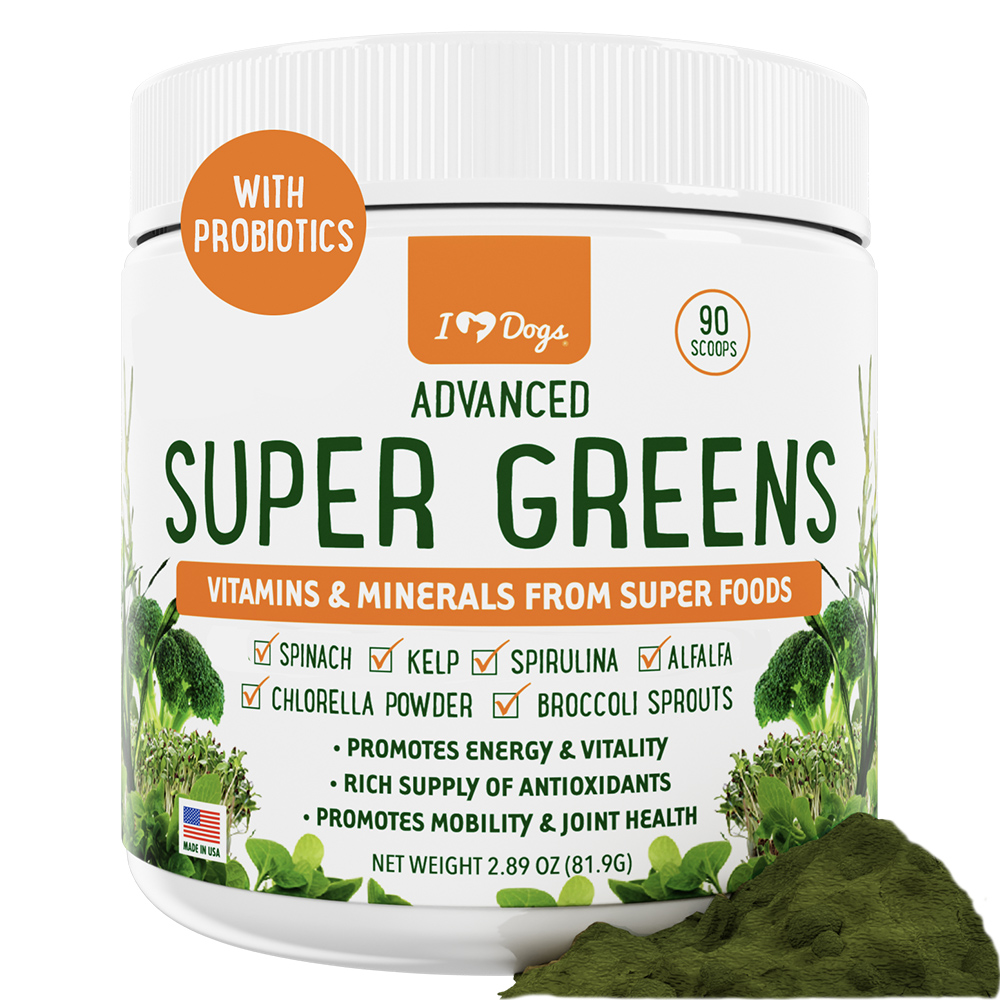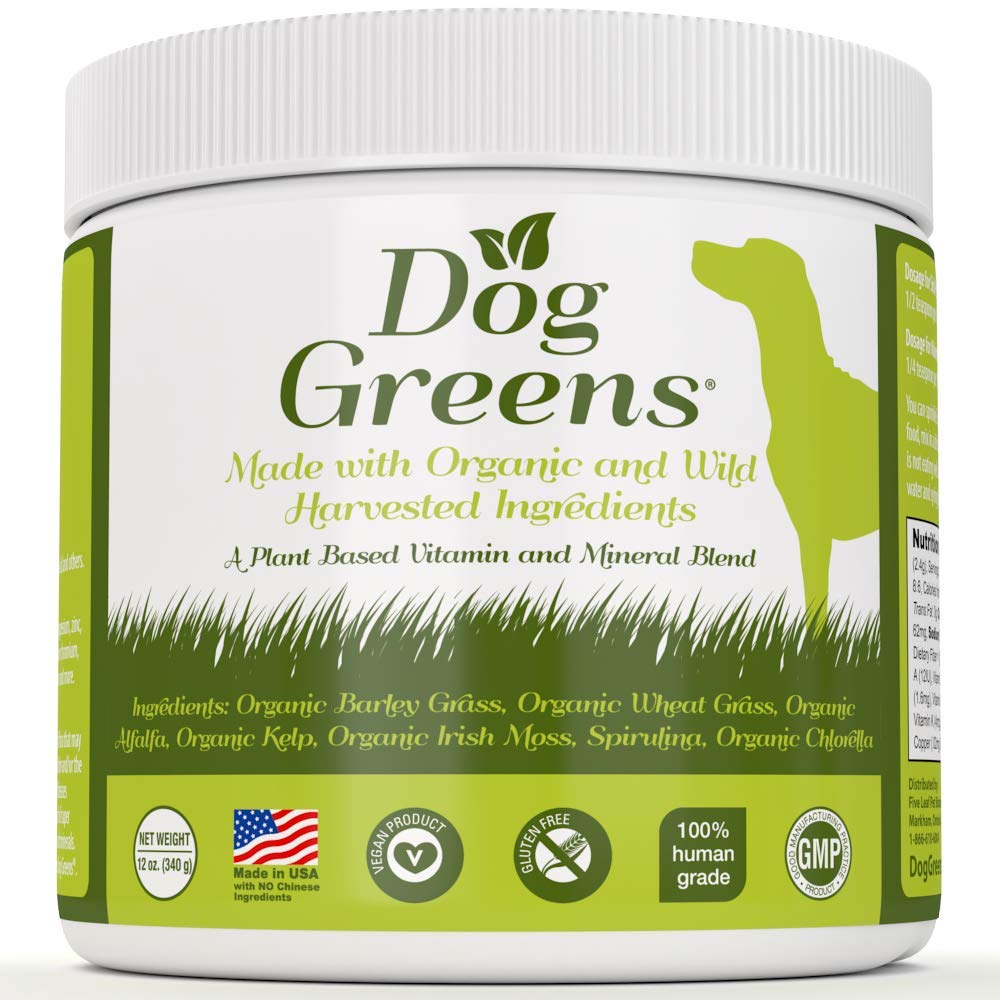iHeartDogs is reader-supported. Some of the links below may be paid affiliate links, where we receive a small commission on a product at no additional cost to you.
Alfalfa, a nutrient-rich plant, has been garnering attention in the canine world for its health benefits. In this comprehensive article, we explore the best alfalfa supplements for dogs, shedding light on their nutritional advantages and how they can enhance your dog’s well-being. Rich in vitamins, minerals, and antioxidants, alfalfa supplements can play a crucial role in your pet’s diet, supporting everything from joint health to digestive wellness. We’ll delve into the top alfalfa supplements available, and their specific benefits, and provide guidance on selecting the right product for your furry companion. Whether you’re a long-time dog owner or new to pet parenting, this guide will equip you with the knowledge needed to make an informed decision in boosting your dog’s health with alfalfa supplements.
Super Greens powder for Dogs is a natural multivitamin to cover your dog’s vitamin and mineral needs through functional superfoods and helpful healthy bacteria. Works with kibble, freeze-dried, or raw dog food.

#2 – Dog Greens- Organic and Wild Harvested Vitamin and Mineral Supplement for Dogs – Add to Home Made Dog Food, RAW Food or Kibble – No Hassle-30 Day
Dog Greens is an organic and wild-harvested vitamin and mineral supplement for dogs. It can be added to homemade dog food, raw food, or kibble, providing bioavailable vitamins and minerals for a long and healthy life. Made with organic ingredients such as barley grass, wheat grass, alfalfa, kelp, Irish moss, chlorella, and natural spirulina, it is gluten-free and free from fillers, artificial flavoring, synthetic or Chinese ingredients. Suitable for dogs and cats of all ages, including puppies and kittens.

#3 – Vet Classics Antioxidants with Coenzyme Q-10 for Dogs, with Alfalfa, Green Tea, Vitamin C, and wheat Grass, 120 Chewable Tablets
Vet Classics Antioxidants with Coenzyme Q-10 is a dog supplement that contains antioxidants such as alfalfa, green tea, vitamin C, and wheatgrass. These antioxidants help to eliminate free radicals in the body that can lead to cellular damage. The product is designed to support overall wellness, and healthy aging, and can assist with various health conditions including skin or ear issues, respiratory infections, and chronic conditions. It is suitable for dogs and cats over 12 weeks of age and is made in the USA.

What Are The Benefits of Alfalfa for Dogs?
Alfalfa, a perennial herb rich in nutrients, offers several health benefits for dogs when included in their diet in appropriate amounts:
- Rich in Essential Nutrients: Alfalfa is a great source of vitamins, including A, C, E, and K, as well as minerals like calcium, potassium, phosphorus, and iron. These nutrients are essential for maintaining overall health in dogs.
- Joint Health Support: Due to its anti-inflammatory properties, alfalfa can benefit dogs suffering from arthritis or joint pain. It helps in reducing inflammation in the joints, thereby alleviating discomfort and improving mobility.
- Digestive Aid: Alfalfa is high in dietary fiber, aiding digestion. It can help regulate bowel movements and alleviate constipation, ensuring a healthy digestive system.
- Immune System Booster: The rich array of vitamins and minerals in alfalfa can help strengthen the immune system, making dogs more resistant to infections and diseases.
- Supports Kidney Function: Alfalfa has diuretic properties, which can support kidney function by promoting the elimination of toxins through increased urine production.
- Skin and Coat Health: The nutrients in alfalfa, especially vitamins A and E, contribute to healthy skin and a shiny coat, making it beneficial for dogs with skin issues or dull coats.
- Weight Management: The high fiber content in alfalfa can be helpful in weight management for dogs, as it promotes a feeling of fullness and can aid in controlling appetite.
It’s important to gradually introduce alfalfa into your dog’s diet in controlled amounts, as excessive consumption can lead to issues. Also, not all dogs may benefit from alfalfa, especially those with certain health conditions, so it’s advisable to consult a veterinarian before adding it to your pet’s diet.
Frequently Asked Questions About Alfalfa for Dogs
1. Is alfalfa safe for dogs to eat?
Alfalfa is generally safe for dogs in moderate amounts. It is a nutrient-rich herb that can provide vitamins, minerals, and protein. However, it should be introduced slowly to your dog’s diet to monitor any allergic reactions or digestive issues. Alfalfa supplements are also available, but it’s best to consult a vet before adding them to your dog’s diet.
2. What are the health benefits of alfalfa for dogs?
Alfalfa can offer several health benefits for dogs, including improved digestion, joint health, and a boost in energy levels. It is rich in essential nutrients like calcium, potassium, magnesium, and vitamins A, C, E, and K. These nutrients support strong bones, a healthy coat, and overall well-being. However, the benefits can vary depending on the dog’s health status and dietary needs.
3. How much alfalfa should I give my dog?
The appropriate alfalfa for your dog depends on size, age, and health condition. Generally, a small amount mixed into their regular food is sufficient. For specific dosages, it’s best to consult with your veterinarian. Overfeeding alfalfa can lead to digestive upset or nutrient imbalances.
4. Can alfalfa help with my dog’s arthritis?
Alfalfa is known for its anti-inflammatory properties, making it potentially beneficial for dogs with arthritis. It may help reduce joint pain and improve mobility. However, alfalfa should be used as a supplement to, not a replacement for, prescribed arthritis treatments. Always consult with your vet before using alfalfa for arthritis management.
5. Are there any side effects of alfalfa in dogs?
While alfalfa is generally safe, some dogs may experience side effects like gastrointestinal upset, diarrhea, or gas. Rarely, allergic reactions can occur. Dogs with hormone-sensitive conditions should avoid alfalfa due to its potential estrogen-like effects. Always introduce alfalfa gradually and consult your vet if you notice any adverse reactions.
6. Can puppies consume alfalfa?
Puppies can have alfalfa but in very small amounts. Its high nutrient content can support growth and development. However, puppies have delicate digestive systems, so introduce alfalfa slowly and watch for any signs of digestive distress. Consult your veterinarian for guidance on incorporating alfalfa into a puppy’s diet.
7. Does alfalfa interact with medications my dog might be taking?
Alfalfa can interact with certain medications, including blood thinners and immunosuppressants. If your dog is on medication, consult with your veterinarian before introducing alfalfa to ensure there are no potential interactions. Monitoring your dog’s response when combining alfalfa with any medication is crucial.
8. How should I introduce alfalfa into my dog’s diet?
Start by introducing a small amount of alfalfa into your dog’s diet and gradually increase it. This helps prevent digestive issues and allows you to monitor for adverse reactions. Alfalfa can be added as fresh greens, dried leaves, or in supplement form. Always consult with your vet before making significant dietary changes.
9. What forms of alfalfa are best for dogs?
Alfalfa for dogs is available in various forms, including fresh leaves, dried herbs, and supplements like tablets or powder. Fresh or dried alfalfa can be mixed into your dog’s food, while supplements should be used as per the dosage instructions. Choose a form your dog prefers and is easiest for you to administer.
10. Can alfalfa help with my dog’s kidney health?
Alfalfa may support kidney health due to its diuretic properties, helping to flush out toxins from the body. However, for dogs with pre-existing kidney conditions, consult your veterinarian before introducing alfalfa, as it might alter the body’s balance of fluids and electrolytes. Always use alfalfa as a complementary treatment, not a primary therapy for kidney issues.
Conclusion: Best Alfalfa Supplements for Dogs
In conclusion, incorporating the right alfalfa supplement into your dog’s diet can significantly contribute to overall health and vitality. As we’ve explored, these supplements offer a range of benefits, from supporting joint health to enhancing digestion. However, it’s essential to choose a high-quality product and consult your veterinarian to ensure it’s appropriate for your dog’s needs and health conditions. By carefully selecting an alfalfa supplement and integrating it into your dog’s diet, you’re taking a proactive step towards maintaining their health and happiness, ensuring they lead a fulfilling and active life alongside you.
 Toledo, United States.
Toledo, United States.
